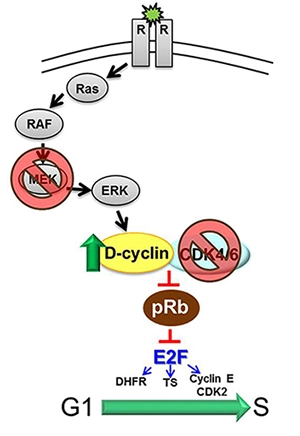LEE011 is a small-molecule inhibitor of two proteins—cyclin-dependent kinase 4 (CDK4) and cyclin-dependent kinase 6 (CDK6), components of a switch that controls the cell cycle. The switch is frequently stuck in the “on” position in cancer cells, leading to uncontrolled growth. A variety of molecular signaling pathways—including RAS, RAF, MEK, ERK, PI3K, AKT and mTOR—converge on the switch, and changes in proteins within these pathways can lead to the switch being stuck in the “on” position. In other words, the switch represents a major hub for signaling, a node that’s absolutely critical for many cancer cells to maintain their devious activity.
And that may make LEE011 a good combination partner. A number of targeted agents hit proteins upstream of the switch.
Cancer cells can circumvent these agents through proteins between the drug target and the switch, tinkering with components of pathways to re-stick the switch. Theoretically, LEE011 could be paired with these agents to thwart the tinkering. In October 2013, Novartis presented preclinical results on LEE011 in combination with other agents, showing that it may be able to prevent the emergence of resistance to the partner compound.
“Think of LEE011 as ketchup or your favorite condiment,” says Sunkyu Kim, Senior Investigator II in Oncology at NIBR. “It’s an ingredient that may make other things better. In preclinical models, LEE011 enhances the activity of other targeted agents and potentially prevents the development of resistance.”

A team presented promising clinical data this month at ASCO, demonstrating preliminary antitumor activity of LEE011 in combination with MEK162 in patients with a particular type of melanoma. As of December 2013, 6 of 14 patients had achieved tumor shrinkage of 30% or more, with monitoring ongoing to confirm the responses. Several patients also reported improvement in their symptoms. The most common treatment-related adverse events were increase in blood creatinine phosphokinase levels, nausea, rash, edema, increase in blood creatinine levels, and decrease in white blood cell counts.
Teams also presented clinical data for two additional studies involving LEE011—a study of LEE011 and BYL719 in combination with letrozole in a common type of breast cancer and a study of LEE011with everolimus and exemestane in the same type of breast cancer. Finally, they presented the trial design for a single agent study in advanced solid tumors and lymphomas. Other early-phase clinical trials involving LEE011 are ongoing.
LEE011 was discovered by the Novartis Institutes for BioMedical Research in collaboration with Astex Pharmaceuticals.



